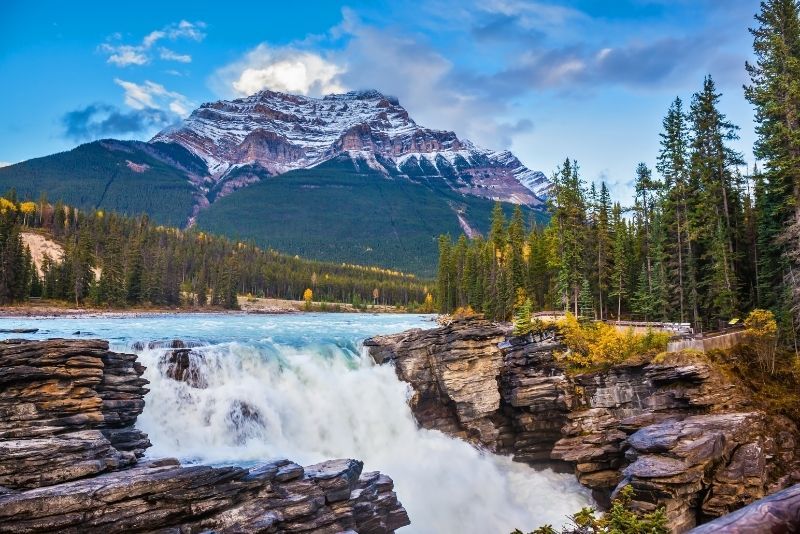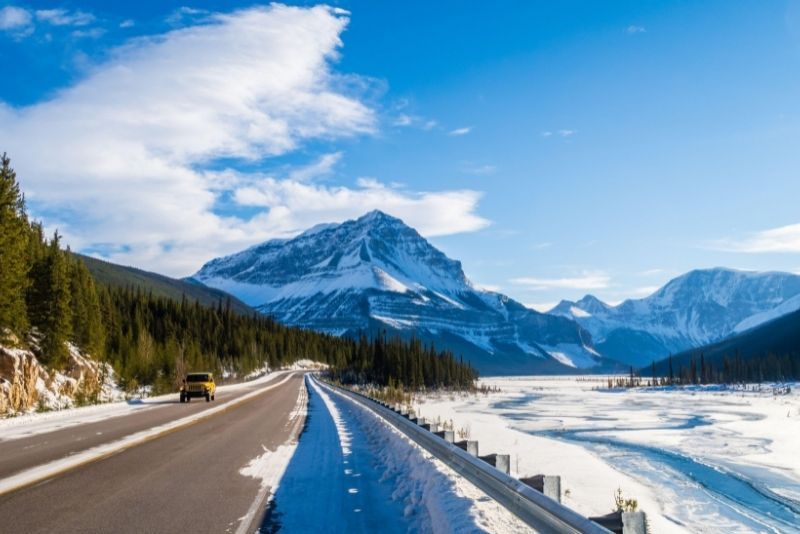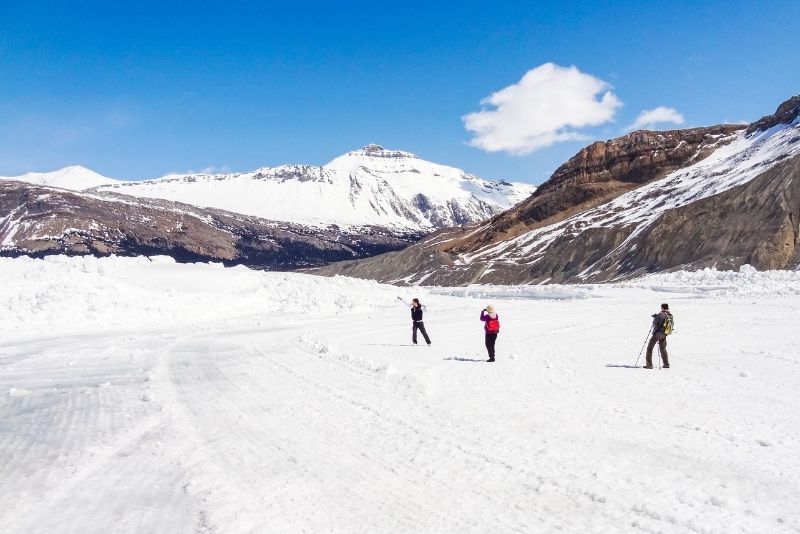Athabasca Glacier: Day Trips and Tours from Banff
Athabasca Glacier is one of the most accessible ice formations in the world, enabling visitors to gain an insight into 13,000 years of geological history.
Stepping onto the glacier allows you to connect with the history of life on earth and imagine what the globe looked like all those years ago.
Athabasca Glacier is one of the most accessible ice formations in the world, enabling visitors to gain an insight into 13,000 years of geological history.
Stepping onto the glacier allows you to connect with the history of life on earth and imagine what the globe looked like all those years ago.

(0/24) checking Musement...
Athabasca Glacier is one of the most accessible ice formations in the world, enabling visitors to gain an insight into 13,000 years of geological history.
Stepping onto the glacier allows you to connect with the history of life on earth and imagine what the globe looked like all those years ago.
A day trip to Athabasca Glacier from Banff is an exhilarating once-in-a-lifetime experience for adventurers of all ages.

Here's all you need to know about Athabasca Glacier, one of the most exciting day trips from Banff.
How to get to Athabasca Glacier from Banff?
Athabasca Glacier is located along Icefield Parkway in Jasper National Park. It is approximately 190 kilometers from the town of Banff.
From Banff to Athabasca Glacier by car
When making the journey to Athabasca Glacier by car, you cannot park directly at the iceberg. Instead, you’ll make your way to the Columbia Icefield Discovery Center, which is located close by.
Leaving Banff in a northerly direction, you’ll follow the Trans-Canada Highway — also known as Route 1 — as far as Lake Louise, and then make your way along Icefield Parkway to the center. The entire route takes just over 2 hours to complete.
Guided tour to Athabasca Glacier from Banff
As there is no public transportation available, the best way for those without access to a car to make the jaunt to Athabasca Glacier is on a guided tour.
These excursions last approximately 11 hours, leaving from a pre-determined meeting point in Banff around 8 AM.
How much does the entrance ticket to Athabasca Glacier cost?
While there is no specific entrance fee for Athabasca Glacier, the site is located in Jasper National Park, for which you need a daily pass.
The cost of this pass is reasonable and the proceeds go toward maintaining the nature reserve, and its facilities.
- Adults: CA$10.50 (US$8)
- Children under 18: Free
- Seniors aged 65+: CA$9 (US$7)
You can also purchase a family/group pass, which costs CA$21 (US$15) and covers the entrance fee for up to seven individuals traveling together in one vehicle, for your Athabasca day tour.
What is the typical itinerary?
After meeting your guide in the center of Banff, you’ll begin your Athabasca Glacier day trip by driving the long distance to the iceberg itself.
As you aren’t in the driver's seat yourself, you’ll have the opportunity to sit back and relax as you marvel at the scenery passing you by.
When you reach the glacier, your group will board a separate vehicle, designed for driving on an icefield, and you’ll participate in a guided day tour of Athabasca Glacier.
These tend to be commentated and you’ll enjoy learning about the ancient history of this colossal ice formation. After spending time atop the glacier, you’ll return to your vehicle, and visit several magnificent sites on way back to Banff.
Most of the time on your Athabasca Glacier day tour is taken up driving or exploring the icefield itself, so you should expect to spend only a few minutes in these other destinations, which include the tranquil Bow Lake.
What kinds of tours are available to go to Athabasca Glacier?
Athabasca day trips enable you to discover a handful of Canada’s most picturesque natural attractions in just a few short hours.
Guided tours to Athabasca Glacier from Banff

On a day trip to Athabasca Glacier, you’ll have the opportunity to visit several sites along the iconic Icefield Parkway. Leaving Banff behind, you’ll embark on a lengthy drive that is anything but boring.
With so much nature surrounding you, you’ll be able to spend your time wildlife-spotting and admiring the mountainscape.
Upon arrival, you’ll hop aboard a six-wheeled “ice explorer” vehicle and set off to discover the 13,000-year-old glacier.
Stroll along the Glacier Skywalk and stand on the glass platform that provides unbeatable views over the Sunwapta Valley from a height of 280 meters if you dare.
Once you’ve had your fill of this historic glacier, you’ll continue along a scenic stretch of Icefield Parkway, stopping off at Crowfoot Glacier and Bow Lake.
While the breaks at these locations are short, you’ll have time to snap a photo and be awed by mother nature.
How much does a day trip to Athabasca Glacier from Banff cost?
An Athabasca Glacier day tour costs between US$230 and US$240 per person.
This price includes round-trip transportation, entrance fees to the Glacier Skywalk and the services of a professional guide.
You’ll also be provided with a picnic lunch, courtesy of your tour provider.
What will you see and do?

Athabasca Glacier is one of the icebergs that form Columbia Icefield — the largest icefield in the Rocky Mountains. The Columbia Icefield was formed during the Illinoisan Period, which lasted for over 100,000 years and began over 240,000 years ago.
Although Athabasca Glacier is the most famous and visited of the six icebergs here, the five other glaciers that form Columbia Icefield include Castleguard Glacier, Columbia Glacier, Dome Glacier, Stutfield Glacier, and Saskatchewan Glacier.
These ice formations have been reducing in size for over 100 years as global warming continues to heat the overall temperature of the earth. In fact, Athabasca Glacier alone is shrinking at a rate of 5 meters per year.
The icefield is surrounded by some of the highest peaks in the Rocky Mountains, including Mount Alberta, which stands over 3,600 meters high.
Although Athabasca Glacier was formed thousands of years ago, its remote location allowed it to remain relatively undiscovered until the 19th century, when intrepid explorers happened upon the geological phenomenon.
Athabasca is the only one of the six glaciers that can be seen from Icefield Parkway and is the easiest to access, which is why it attracts over a million outdoor enthusiasts annually during the summer months.
The icefield measures a colossal 325 square kilometers and experiences almost 7 meters of snow each winter. The iceberg is so pure that visitors drink fresh water straight from the glacier itself, which has become somewhat of a tourist attraction in recent years.
When is the best time to visit Athabasca Glacier?
The best time to plan a day trip to Athabasca Glacier is during the summer months — from June to September.
Around this time, daytime temperatures range from 10 to 15 degrees Celsius and the weather is the most reliable.
You can visit Athabasca Glacier during the winter months, however, you’ll risk road closures if the conditions are too icy or there’s a chance of an avalanche.
Travel tips
- The conditions at Athabasca Glacier are relatively chilly year-round. Wrap up in plenty of layers and carry additional clothing with you in case the weather turns sour.
- Athabasca Glacier day trips provide you with a packed lunch. If you have any dietary requirements, make these known to your tour operator upon booking.
- It is not recommended to attempt hiking to Athabasca Glacier independently. Instead, book a guided day trip or select a tour guide once you arrive at the Columbia Icefield Discovery Center.
- Wear sturdy, waterproof hiking boots on your Athabasca Glacier excursion in order to protect your feet from the elements. If possible, you should ensure your boots are worn in before your vacation to ensure maximum comfort.

